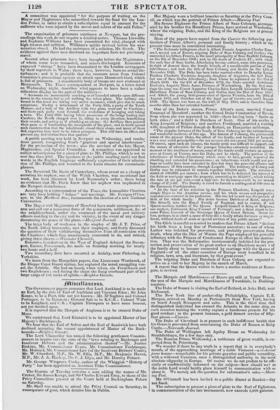The examination of prisoners continues at Newport, hut the pro-
ceedings this week do not require a detailed notice. Thomas Llewellin
and Zephania Williams have been committed for trial, charged with high treason and sedition. Williams's spirits revived before his exa-
mination closed. He had the assistance of a solicitor, Mr. Cenci'. The evidence against these men disclosed no important flies not previously stated.
Several other prisoners have been brought before the Magistrates ; of whom some were remanded, and others discharged. Rumours of expected " risings " have been transmitted to the London newspapers
by their reporters in Wales : there have, however, been no actual dis- turbances; and it is probable that the rumours arose from Colonel Considine's precautions against an attack upon Monmouth Gaol, which is full of prisoners. A considerable body of troops are now stationed at Montuouth. The Times correspondent at Newport, in a letter dated on Wednesday night, describes what appears to have been a rather ridiculous display on the part of the military- " Accounts are momentarily reaching us of intended attacks upon different towns in the county, but as yet nothing has taken place. The military sta- tioned in this town are taking very active nnasures, which give rise to much conjecture. To-day a detachment of the Forty .fifth, a party of the Tenth Hussars, and a body of the Artillery with two guns, went out to Caerleon ; and there each party went through the evolutions of besieging and taking a town. Thc Iorty-fifth having taken possession of the bridge leading into Curlew), the Tenth charged over it, riding in every direction, brandishing their swords, and acting as if attacking an enemy : the Artillery then pointed their guns as if bombarding the strongholds of the place, and in truth spread such consternation that the inhabitants closed their shops, and many of them fled, expecting they were to be taken prisoners. This will have its effect, and prevent any molsstation from that quarter."
A public meeting was held in Newport on 'Wednesday, and resolu- tions passed, recognizing God's "gracious and special interference" for the protection of the town ; also the services of the late Mayor,
Magistrates, and Special Constables. A committee was appointed to collect subscriptions for a piece of plate to Mr. Phillips, which is not to
cost loss than 200/. The speakers at the public meeting could not find words in the English language sufficiently expressive of their admira- tion of Mr. Phillips, and resorted to the Latin classics for encomiastic phrases.
The Reverend Mr. Davis of Canterbury, whose arrest on a charge of secreting his nephew, one of the Welsh Chartists, was mentioned last
week, has been liberated by Lord Normanby's order ; there being no evidence that Mr. Davis knew that his nephew was implicated in the Newport disturbances.
According to a correspondent of the Times, the Lancashire Chartists are very busy holding " lodges " and meetings. Mr. Feargus O'Con- nor, in the Northern Star, recommends the election of a new National Convention.
The Mayor and 3Iagistrates of Hereford have made arrangements to arm and call out a numerous force of the pensioners, militiamen, &c. of the neighbourhood, under the command of the naval and military officers residing in the city and its vicinity, in the event of any danger threatening the peace of the place.—Herviard Journal.
The large body of workmen in the employ of Mr. J. T. Price, of the North Abbey ironworks, met their employer, and freely discussed the question of their withdrawing themselves from all connexion with the Chartists ; which they unanimously consented to do, and retired, giving three cheers.— Worcester Chronicle. Extensive inundations in the West of England delayed the Devon- port, Exeter, Porzsmouth, S;c. mails on Saturday morning for nearly two hours and a half.
Two incendiary fires have occurred at Aislaby, near Pickering, in Yorkshire.
We learn from the Hampshire papers, that Lieutenant Westbrook, of the Dieppe Coast Guard station, has captured the noted smuggling ves- sel, the Aristide. She had on board, when taken, six Frenchmen and two Englishmen ; and during the chase she flung overboard part of her large cargo of 141 casks of spirits.—Briyhton Gazette.


























 Previous page
Previous page